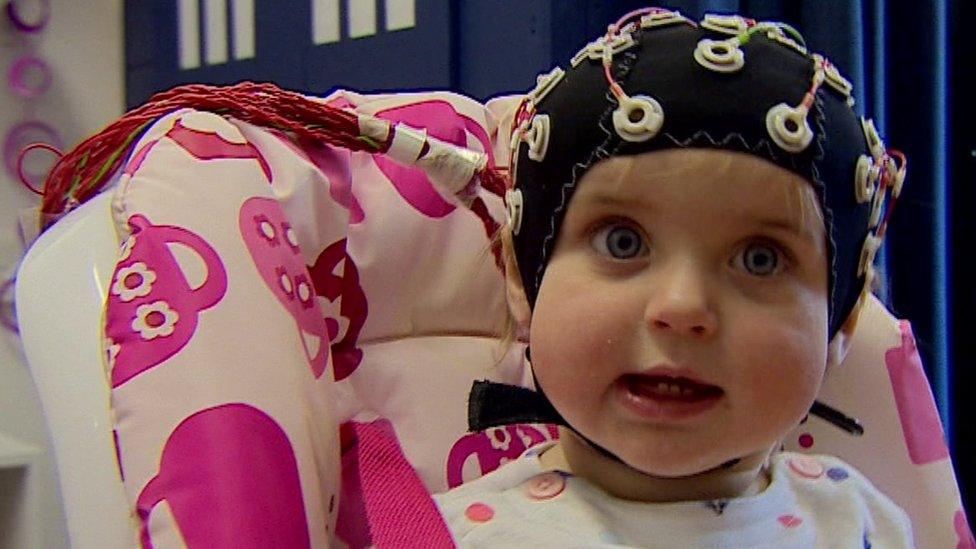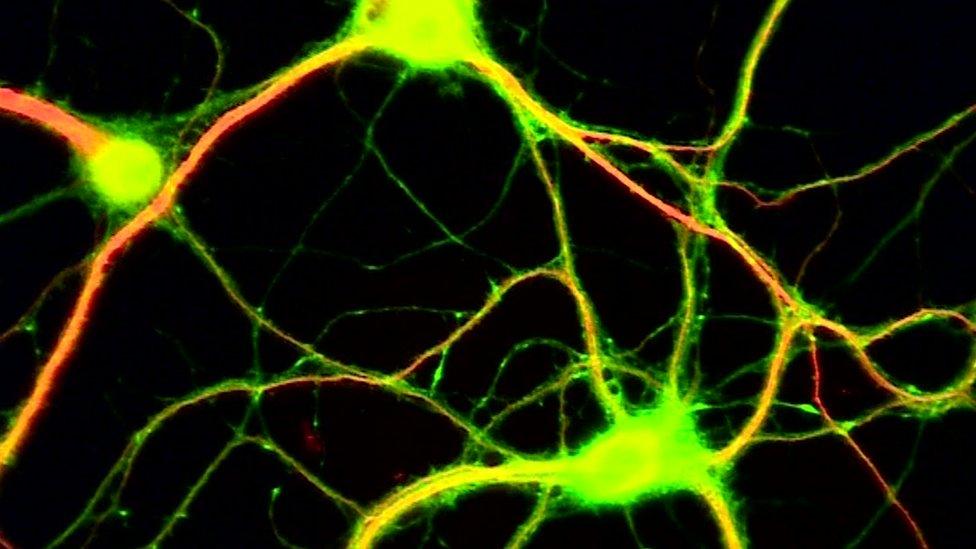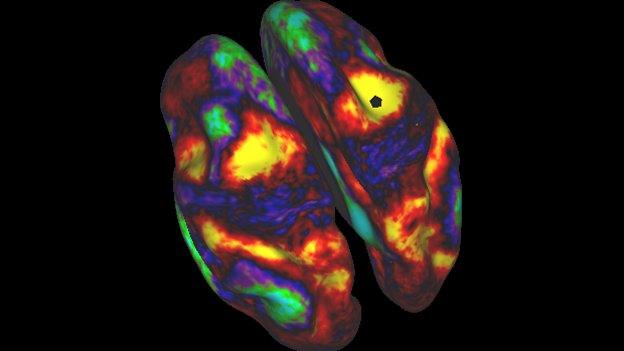Infants' brains attuned to baby talk and nursery rhymes
- Published

The cap on Poppy's head is picking up her brain waves in a research project to learn more about how babies learn
Researchers in Cambridge believe that babies learn best when their brain waves are in sync with their parents'.
The study has also shown that infants are attuned to baby talk and nursery rhymes.
The research indicates that babies need to feel safe, secure and loved for brain connections to be properly formed to enable them to learn effectively.
The findings are emerging from a baby brain scanning project at Cambridge University.
To a newborn, the world is a rush of sights and sounds, an overload of information. But then the world gradually comes into focus. Babies soon learn to recognise faces and voices and over the coming months learn how to move, understand language and make sense of what is around them.
This is a crucial moment in all our lives when important connections are being formed in the brain.
To learn just how this happens, researchers at a baby lab in Cambridge are scanning the brains of babies and their mums while the two are interacting in learning activities.
The early indications are that when the brain waves of mothers and babies are out of sync, the babies learn less well. But when the two sets of brainwaves are in tune they seem to learn more effectively.
Dr Victoria Leong, who is leading the research, has discovered that babies learn well when their mums speak to them in a soothing sing-song voice which she calls "motherese".
Dr Leong's research shows that nursery rhymes are a particularly good way for the mums in her study to get in sync with their babies.
"Although it sounds odd to us, babies really love listening to motherese even more than adult speech. It holds their attention better and the speech sounds clearer to them. So we know the more motherese the baby hears, the better the language development," she said.
Dr Leong says the same is undoubtedly true if infants hear baby talk and nursery rhymes from fathers, grandparents and any other carers, but her experiments to date have focused on the interaction between mothers and their babies.
"The baby brain is set to respond to motherese, which is why it is such an effective vehicle for teaching babies about new information," she says.
Dr Leong's team has also found that babies respond better when there is prolonged eye contact. Mums who sang nursery rhymes looking directly at their babies held their attention significantly better than those who gazed away, even occasionally.

Babies learn by making and strengthening connections between different parts of their brains
So should busy, multitasking parents worry if they occasionally glance at their phones while caring for their babies?
"No, not at all," says Dr Leong. "By-and-large, most parents do a wonderful job with parenting. Brain development is only affected in extreme cases of neglect or lack of attention."
Dr Leong's findings, that babies respond well to good face-to-face interactions and conversations is well established in behavioural studies. But what is new is that her team is trying to learn what happens inside the brain when babies are receiving quality attention.
"My work is to understand the neurological underpinnings of these effects," she said.
"How is it that the baby's brain treats the social interactions with its mother and how is it that it is helping learning?"
Babies learn by making physical connections in their brains when they learn something new. Human brains take years to develop because we have so much to learn. Babies explore different ways of making sense of the world mostly through play until they suddenly make a breakthrough and it is then that a connection is formed and strengthened in their brain.
But, according to Dr Kirstie Whitaker, who is a brain researcher at Cambridge University's psychiatry department, sometimes this can happen too quickly.
"If babies experience stress early in life, their brains develop a little too quickly and so rather than work out the very best connections they should make, they go with ones that are good enough.
"And so one of the reasons I would urge a supportive and nurturing environment is to allow children to explore and stay in that particularly curious and flexible brain development for as long as possible."
And so, is the research suggesting that love helps form the physical connections necessary for brain development?
"The behaviours that love produce are good for learning," says Dr Leong. "Drawing each other into conversation, giving each other attention and being in the moment together are all good for learning."
Follow Pallab on Twitter, external
- Published10 April 2013

- Published5 March 2013
